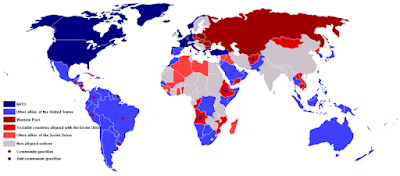Days of Future Past
 I've been refereeing a Twilight: 2000 campaign using the new edition recently released by Free League. The campaign began in early December and is played weekly with a group of seven players, who've elected to call their little band (for reasons that are largely the result of an in-joke and thus have no deeper meaning) Barrett's Raiders. I've been having a lot of fun with the campaign thus far, though I don't yet feel fully proficient in the new rules, particularly those for combat, which are quite different than those in the 1984 edition of the game with which I am most familiar. That's to be expected; I am sure, after a few more months of play, that I'll be sufficiently acclimatized to the new rules that I'll be able to referee our sessions almost effortlessly.
I've been refereeing a Twilight: 2000 campaign using the new edition recently released by Free League. The campaign began in early December and is played weekly with a group of seven players, who've elected to call their little band (for reasons that are largely the result of an in-joke and thus have no deeper meaning) Barrett's Raiders. I've been having a lot of fun with the campaign thus far, though I don't yet feel fully proficient in the new rules, particularly those for combat, which are quite different than those in the 1984 edition of the game with which I am most familiar. That's to be expected; I am sure, after a few more months of play, that I'll be sufficiently acclimatized to the new rules that I'll be able to referee our sessions almost effortlessly.At the time of its original release, Twilight: 2000 was set sixteen years in the future. The good folks at GDW, being thoughtful and intelligent men – in addition to being well-read on matters military – did, I think, a pretty job of imagining a limited nuclear conflict scenario between NATO and the Warsaw Pact that was both plausible and, above all, playable, given then-current information. As we now know, the real world rather quickly was at odds with this scenario and, despite the best efforts of GDW to tweak it to take into account the unfolding of history, Twilight: 2000 was soon relegated to realm of alternate history.
Now, like a lot of nerds, I have a great fondness for alternate histories. Yet, for some reason I can't fully explain, I prefer that the points of divergence in my alternate histories be well in the past. Consequently, I had a difficult time continuing to play Twilight: 2000 in the immediate aftermath of the fall of the Berlin Wall and the collapse of the Soviet Union. An alternate World War II? Sure! An alternate conclusion to the Cold War? No – at least not in the 1990s or even early 2000s. Again, I don't pretend this prejudice on my part is any way rational, only that it's one I feel quite strongly, hence my putting Twilight: 2000 on the shelf for several decades.
By the time Free League announced they were producing a new edition, I had already become much more comfortable with the idea of looking on the game as set in an alternate history. As luck would have it, I was already in the midst of re-reading all my old GDW supplements when I heard the news of a new edition, which I took as a sign from the gaming gods that I ought to start up a campaign on its release. And so I did, as I've explained before.
Free League's version of the game uses an alternate history, of course, but it's an alternate history where the point of divergence is in the early 1990s. The coup attempt against Gorbachev in 1991 succeeds and the USSR emerges revitalized and ready to launch the Sino-Soviet War in 1995. I understand why they went this route, but I don't much like it myself, preferring instead the 1984 timeline, which (for obvious reasons) does not include Gorbachev's rise to power at all. Quite simply, I prefer to referee a campaign set in the year 2000 as imagined by people living in 1984 than in one that shares the real world's history up until 1991. Once more, I say: this is not a wholly rational preference on my part but its one that makes it easier for me to run a game set in the aftermath of an alternate history World War III.
This preference has many consequences, as I keep reminding my players. So many aspects of the real 1990s, especially technological ones, do not exist in my Twilight: 2000 campaign. For example, computer technology is not as advanced as in our world. Likewise, the Internet, while it exists as ARPANET, has not had a significant impact on society, due to its limited user base. On the other hand, some experimental technologies from 1984, like the H&K G11 weapons system, entered service in this alternate history and are now more widely used. The same is true for a number of other bits of military hardware that, in our world, were never adopted.
One of the reasons I enjoy alternate histories is the consideration of paths not taken. This campaign has only just begun and the player characters have not yet got very far from their starting point – indeed, only four days have passed in-game – but I can already begin to see the seeds from which further historical divergences might grow. It's my hope, as the months roll on, that the characters will have the chance to influence events not just in southwestern Poland but perhaps farther afield. My dream is that, eventually, those that survive might make it back home to the USA and help rebuild it in the aftermath of the war. For now, I'm enjoying the ride, wherever it goes.
James Maliszewski's Blog
- James Maliszewski's profile
- 3 followers



